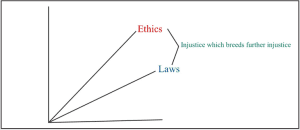Criminal behavior often stems from individuals who have experienced significant hardship, such as poverty, discrimination, or previous victimization. Vulnerable populations, including the poor and marginalized communities like Scheduled Tribes (STs), are disproportionately represented among offenders. Their criminal actions frequently reflect the systemic injustices and adversities they face.

Philosophical Perspective
Judicial perspectives emphasize the need for reformation and rehabilitation. The Supreme Court of India in various judgments, has underscored the importance of giving offenders a chance to reform. Internationally, countries like Norway focus on rehabilitation over retribution, reflecting a more humane approach to criminal justice. In Mohammad Giasuddin v. State of Andhra Pradesh, Justice V.R. Krishna Iyer emphasized that reformation should be the dominant objective of punishment, advocating for efforts during incarceration to reform and rehabilitate prisoners.
| Aristotle’s emphasis on the Cardinal Virtue of character-building resonates in addressing the root causes of criminal behavior. By fostering virtues like justice, temperance, and courage through education, parenting, and societal institutions, we can cultivate individuals who lead virtuous lives. |
Punishment, initially, is the conscious effort of making the offender pay for the wrongs committed but ethics should be paramount in the criminal justice system. Modern legal jurisprudence increasingly supports leniency and opportunities for reform, such as granting bail and acquittal in deserving cases. The recent Porsche bail case exemplifies this trend. Globally, there is a move towards abolishing the death penalty and focusing on rehabilitation rather than retribution.
| As Victor Hugo aptly said, “He who opens a school door, closes a prison.” Emphasizing reformation over revenge aligns with a more ethical, just, and progressive society. |

